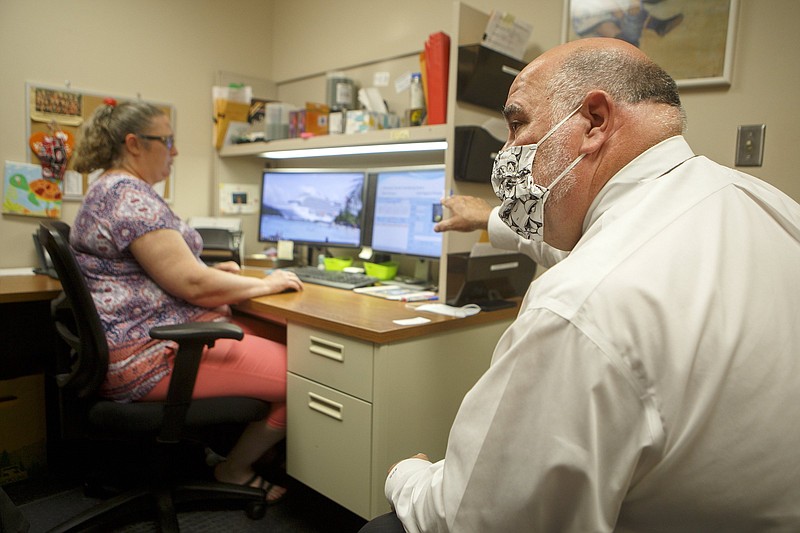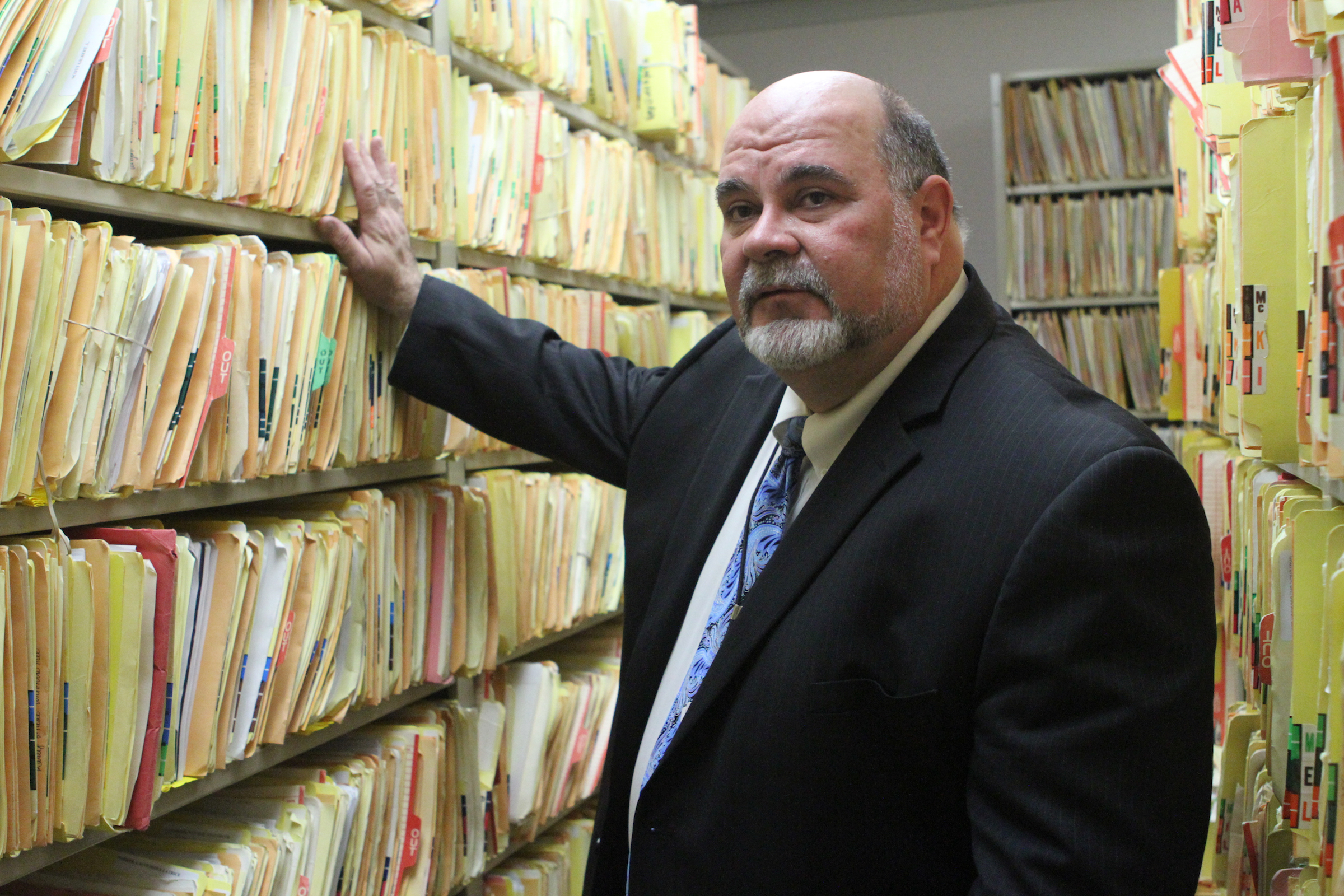When Gary Behler took over as Hamilton County Juvenile Court Clerk in 2011, his clerks didn't have email and meticulously entered court filings and schedules by hand in large ledger books and files that filled shelves from floor to ceiling in several county buildings.
At hearings, clerks would pushcarts filled with paper files into the courtroom for the judge to review.
"We were drowning in paper, shuffling mountains of paper files right here in Gig City," Behler recalls.
But in less than a decade, Hamilton County's juvenile court has made an electronic conversion to shift those bulging paper files into digital records more easily stored, sorted and retrieved. What began as a physical necessity to limit the space requirements for paper files has helped transform how the court operates.
Within the next month, Behler hopes Hamilton County will be the first juvenile court in the state to allow electronic filing of court records.
"We used to have a court docket that required a two-shelf cart on wheels that our clerks had to load up with paper files to bring into the courtroom every day," Hamilton County Juvenile Court Judge Rob Philyaw recalls. "When we wanted to request a file from our records, it would often take anywhere from 30 minutes to two hours to retrieve those files."
Since the juvenile court went electronic with its records, Philyaw and the six magistrates in the juvenile court are able to retrieve almost any record they need with just a few clicks on the court keyboard.
Video cameras added in the courtroom also have allowed remote witnesses and hearings, which have proven critical during the restrictions adopted to limit the spread of the coronavirus this spring. Digital recording equipment, which replaced the often malfunctioning cassette recording system used in the seven courtrooms before, has allowed for easier record keeping and retrieving of hearings and testimony essential in deciding many cases.
The Hamilton County Juvenile Court clerk's office also was the first in the state to handle state billing electronically, reducing preparation time from 35 hours to less than an hour. For individuals coming into the court, the court was also one of the first in Tennessee to install a kiosk in the lobby in January that connects visitors to an array of legal services, family support programs and information sources about child custody, child support and family court issues.
Filing and savings thousands of records
The Juvenile Court Clerk, which has an annual budget of $2.7 million and 36 employees, is responsible for processing and maintaining all legal documents for the Juvenile Court of Hamilton County. As a "court of record," all records, files, documents and recordings must be maintained in perpetuity. Last year, the court handled nearly 30,000 cases of child support, child custody and juvenile court cases.
To launch the digital revolution on all those cases nearly a decade ago, the staff studied Dr. Spencer Johnson's best-selling book on making changes, "Who Moved My Cheese?" Clerks also attended Lean applications conferences and visited other businesses that had already made successful electronic record conversions, including Unum, Cornerstone Bank and other courts.
Rhonda Wheeler, a former Unum manager who joined the juvenile court in 2011 to help with the electronic transformation, says she initially was "completely overwhelmed by the mass amount of paper and files we had to deal with every day" in the juvenile court.
"The clerks were working like hamsters in a wheel going faster and faster and not getting anywhere," she recalls. "They had to do so much extra work to get what needed to be done every day so the need for new technology was great. Making these improvements has allowed our office to be a much greater service to those who need to use our court."
To begin planning for the new technology, a comprehensive workflow analysis was conducted for each department within the Hamilton County Juvenile Court and the Juvenile Court Clerk's Office, yielding 17 workflow diagrams. Digitizing the court documents required hard wiring each court building, adding email capability for all clerk staff, eliminating most desktop printers (with 14 different cartridge types at varying costs) and networking each work station to centralized copiers.
Cutting out the paperwork required not only revamping technology and processes but scanning more than 25,000 records already on file in the Juvenile Court and its child support division. The digital conversion required converting 12 tons of paper into digital files. The massive scanning project took almost 18 months to copy and convert nearly 4 million pages of documents to digital records for all cases since 2013.
"We moved the cheese"
Other counties have turned to outside vendors to make the digital conversions of their paper files, but Hamilton County's information technology office, working with the court clerks, has developed most of the software and electronic programs on their own - and saved money in the process, Behler says.
Rather than pay an outside vendor about $250,000 for software and annual fees of $75,000 or more to maintain the digital service, Hamilton County's IT department developed its own process and bid out the scanning and record conversion to a private vendor at a cost the came in under $150,000.
Behler has also kept most of the same staff of clerks, encouraging and training them to take on totally new ways of doing their jobs.
Gary Hayes, manager of field services and a county government consultant for the University of Tennessee County Technical Assistance Service, says the massive digital record conversion by Hamilton County was the first to be completely done by any juvenile court in Tennessee.
After the new computer system was installed and working, the clerk had emblazoned on the T-shirts made every year for the Hamilton County fair, "We moved the cheese."
"When we began talking about and making these changes when I first came on the bench, I never envisioned it would work as well as well, as easily and as completely as it does," Philyaw says. "This has been a tremendous improvement to make more information available to us much quicker so we can make better and more expeditious decisions."
And in the process, Behler says the county has been able to free up more building space and save tons of paper costs every year.
READ MORE
* (Won't) see you in court: Pandemic forces every element of the legal system to adapt in a hurry
* Pandemic practice: From labor law to estate planning, COVID-19 has reset the bar for many attorneys

